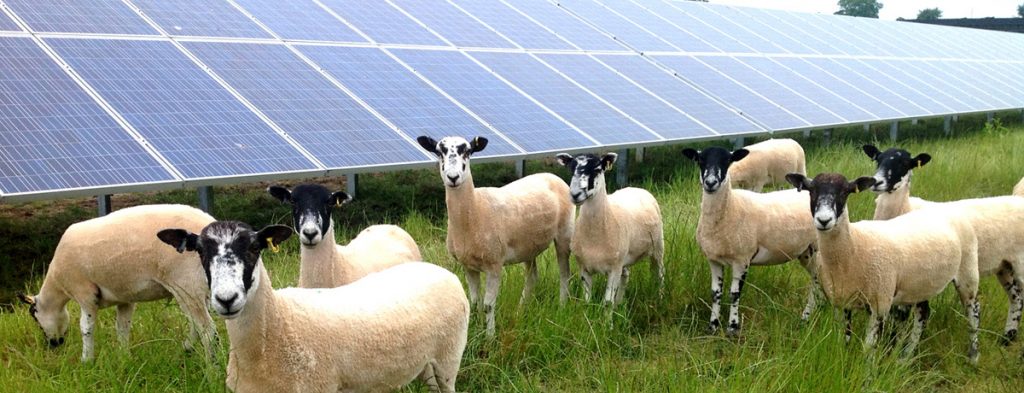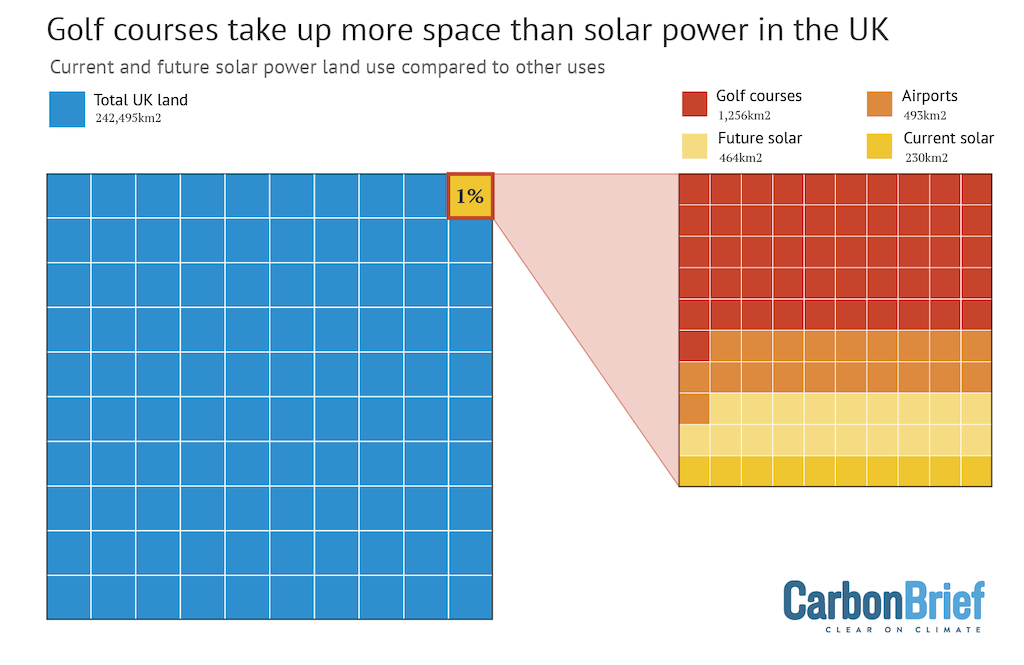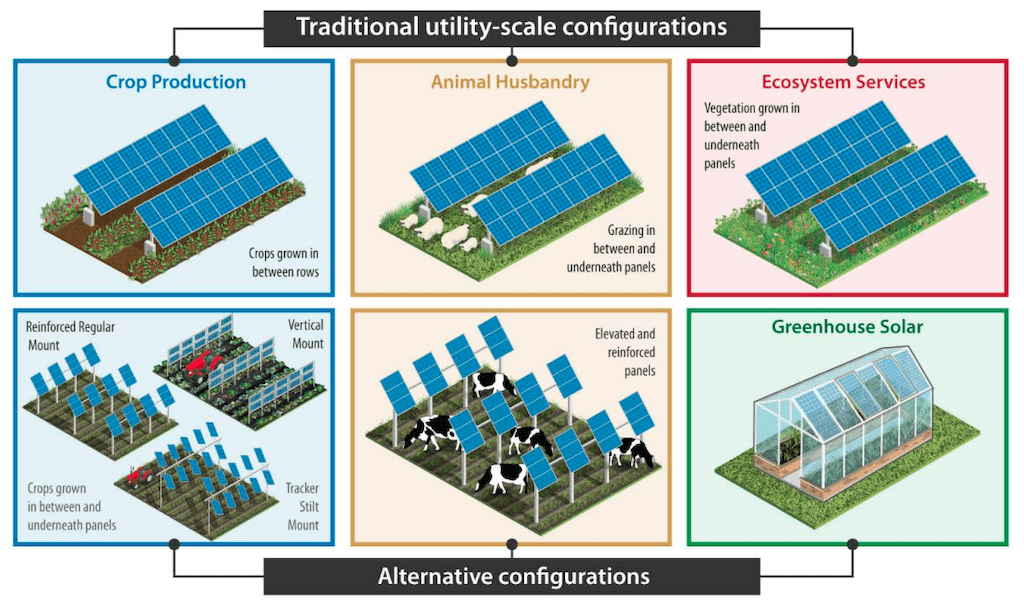“Agrivoltaic farming is the practice of growing crops underneath solar panels. Doubling up on land use in this way could help feed the world’s growing population while also providing sustainable energy.”
.
One of the arguments against housing estates is that they take prime farming land out of production: Thousands of hectares of farmland lost to development since 2010 – FarmingUK News
Including in these parts: Opposition grows to farmland for houses plan by Devon CC – the PRSD and Hundreds of sites are earmarked for new development | Midweek Herald and Hundreds object to Ottery housing development plan | Sidmouth Herald
This is the same argument against solar farms: Why is government guidance not to develop solar on quality farmland being routinely ignored? | The Devon Daily and John Nettles presents Devon CPRE’s ‘Save our fields from solar farms’ campaign. – YouTube
Proposals for a solar farm in East Devon have just been rejected – on similar grounds:
Rockbeare Parish Council objected to the proposal in the “strongest terms” partly due to the “unsuitability” of the development area. They claimed a solar farm would harm the pre-existing agricultural land and would not be conducive to the grazing of sheep. East Devon: Rejection for solar farm set to power more than 18,000 homes
And yet it was supported by environmentalists: Marsh Green solar farm debate not over yet, says councillor | Midweek Herald
If you look to sheep farming elsewhere, however, it does seem to work: Clean ‘Sheep’: These Animals Help Landscaping the Solar Farm That Powers UK Hospital
With more projects across the UK, including the West Country:
John Leith, Development Director at Renewable Connections, said the solar farm will also “operate in synergy” with the existing agricultural business, enabling sheep grazing to continue within the proposed development area, while allowing the farming enterprise to remain financially viable. Welsh solar farm wins planning approval – reNews – Renewable Energy News
“We are very pleased that further to the environmental and biodiversity benefits of the proposal, the land will remain in agricultural use with a grazing license existing on the site for sheep to graze in panel areas. There will also be cereal cropping on approximately 25 hectares of the site, enabling the continued production of food, and support for ground nesting birds such as skylark.” Renewable Connections’ 50MW solar farm receives approval from Cornwall Council | Solar Power Portal
And if we’re looking at sheep and solar, there’s plenty of research going on: How Agriculture and Renewable Energy Can Work Together: The Case for Sheep and Solar Panels – Cornell Small Farms and Sheep and Solar Panels: Using Solar Sites for Pastureland – American Solar Grazing Association
However, a lot of East Devon is also ‘prime agricultural land’ aka arable, rather than pastoral; and yet a recent piece from Greenpeace says that most sorts of farming are compatible with solar farming – and it includes a photo of sheep in Devon, as well as a vineyard in France and a wheat field somewhere in Germany:

Farming and solar panels can work together – here’s the proof | Greenpeace UK
The debate got quite political in the summer:
There has been some pushback to the view being promoted by Truss and Sunak. For example, in the Times, chief reporter Sean O’Neill wrote that the pair are “displaying staggering ignorance” and “pandering to the whingeing nimbys in their tiny electorate”. In the Daily Telegraph, the paper’s chief city commentator Ben Marlow wrote that “Britain’s culture wars have reached such epically absurd proportions that even the sun is now the enemy”. Despite the claims, ground-mounted solar panels currently cover just 0.1% of all land in the UK. Factcheck: Is solar power a ‘threat’ to UK farmland? – Carbon Brief
This piece from Carbon Brief provides an excellent overview of the issues – and arguments for solar – with a couple of telling illustrations, including the suggestion that we might also want to stop building golf courses and airports, in that case:

But as the piece explains, there are so many different ways to do solar on farmland:

Factcheck: Is solar power a ‘threat’ to UK farmland? – Carbon Brief
This is ‘agrivoltaic’ – and there’s more and more interest being shown in the technology and its possibilities – as shown in these pieces from the last couple of months:
Agrivoltaic farming is the practice of growing crops underneath solar panels. Scientific studies show some crops thrive when grown in this way. Doubling up on land use in this way could help feed the world’s growing population while also providing sustainable energy. What’s agrivoltaic farming? Growing crops under solar panels | World Economic Forum
In a world of diminishing resources and rising demands, land increasingly comes at a premium for energy and food production. Could the answer be as simple as combining both? Agrivoltaic farming: can it solve the food and energy crisis?
Rooftops are so 2020. If humanity’s going to stave off the worst of climate change, people will need to get creative about where they put solar panels. Now scientists are thinking about how to cover canals with them, reducing evaporation while generating power. Airports are filling up their open space with sun-eaters. And space doesn’t get much more open than on a farm: Why not stick a solar array in a field and plant crops underneath? It’s a new scientific (and literal) field known as agrivoltaics—agriculture plus photovoltaics—and it’s not as counterintuitive as it might seem. Growing Crops Under Solar Panels? Now There’s a Bright Idea | WIRED
Next-gen solar parks that enable energy and food production as well as water conservation to work in synergy on the same plot can help to solve solar‘s growing land-use issue, according to the researchers making them a reality. “There is this big debate around using land for solar versus using it for agriculture,” said Colorado State University researcher Jennifer Bousselot. “And I just roll my eyes because you don’t have to pick. They can be combined.” “This will be absolutely vital to the future of the energy industry,” added Richard Randle-Boggis from the University of Sheffield. “Especially somewhere like the UK, where sustainable land use is a critical challenge.” Agrivoltaic solar farms offer “shocking” benefits beyond producing energy
.